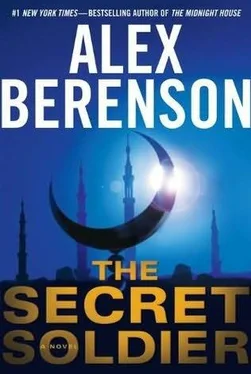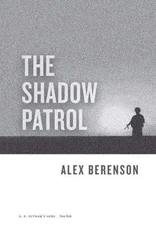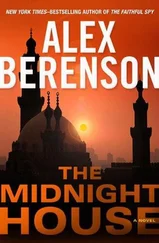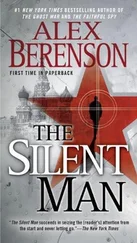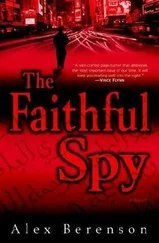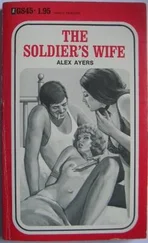Alex Berenson - The Secret Soldier
Здесь есть возможность читать онлайн «Alex Berenson - The Secret Soldier» весь текст электронной книги совершенно бесплатно (целиком полную версию без сокращений). В некоторых случаях можно слушать аудио, скачать через торрент в формате fb2 и присутствует краткое содержание. Жанр: Шпионский детектив, на английском языке. Описание произведения, (предисловие) а так же отзывы посетителей доступны на портале библиотеки ЛибКат.
- Название:The Secret Soldier
- Автор:
- Жанр:
- Год:неизвестен
- ISBN:нет данных
- Рейтинг книги:4 / 5. Голосов: 1
-
Избранное:Добавить в избранное
- Отзывы:
-
Ваша оценка:
- 80
- 1
- 2
- 3
- 4
- 5
The Secret Soldier: краткое содержание, описание и аннотация
Предлагаем к чтению аннотацию, описание, краткое содержание или предисловие (зависит от того, что написал сам автор книги «The Secret Soldier»). Если вы не нашли необходимую информацию о книге — напишите в комментариях, мы постараемся отыскать её.
The Secret Soldier — читать онлайн бесплатно полную книгу (весь текст) целиком
Ниже представлен текст книги, разбитый по страницам. Система сохранения места последней прочитанной страницы, позволяет с удобством читать онлайн бесплатно книгу «The Secret Soldier», без необходимости каждый раз заново искать на чём Вы остановились. Поставьте закладку, и сможете в любой момент перейти на страницу, на которой закончили чтение.
Интервал:
Закладка:
“Is it possible they would hide their involvement? Make these calls to trick us?”
“Possible. But that hasn’t been their style the last few years. And given the risk of making these calls, they’d need a good reason to play that game.”
“I see.”
“There’s something else. As you can see from these intercepts, we have these guys pinned tight. If they do manage to get an op going, we usually hear about it pretty damn quick. We don’t always have enough intel to stop it, but we at least know it’s coming. This time, nothing.”
“So add it all up; you’re telling me this wasn’t Al Qaeda.”
“I had to bet, I’d say no.”
“Who was it, then?”
“I wouldn’t even venture to guess. When I get any intel, you’ll be the first to know. But right now we don’t have anything.”
“I understand,” Kurland said. Though he didn’t, not entirely. The United States spent fifty billion dollars a year on intelligence. He didn’t expect all his questions to be answered right away, but he would have liked some idea what was happening.
Maggs seemed to sense his dissatisfaction. “Sir. I promise you there are literally a thousand people in Langley and Fort Meade, and here, too, working on getting the answer. In Qatar, the FBI can examine the tanker, and in Bahrain the FBI will have access to the bar. But from what I hear, it’s a real mess, and it’s going to take time to sort out. Here, we’ll have to depend on the Saudis. They should be able to trace the car that hit the Khozama. If it wasn’t stolen.”
“And can we expect them to cooperate? Since an American citizen was killed.”
“One American, three British, eight Kuwaitis, twelve Japanese, and twenty-five Saudis, sir. I think we can expect that they’ll give us what they choose when they choose.”
“What about the cell they broke up last night? That should help.”
“I’ve only heard bits and pieces, but I think that’s unlikely. Typically, something like this happens, the mukhabarat arrest whoever’s on their lists, try to prove they’re on top of things.”
Kurland had already left a condolence message for King Abdullah. He wondered if he ought to call Abdullah again. Or Saeed, the defense minister. Or even Nayef, the interior minister. But he decided to wait. He didn’t have anything concrete to offer, and Abdullah was difficult to reach. He was spending a lot of time in his palace in Jeddah, the Kingdom’s second city. Which didn’t make sense to Kurland. Shouldn’t the king be here, in Riyadh? Kurland had started to wonder if the king, now nearly ninety, was turning senile. Or worse.
Saeed, the second most powerful man in the Kingdom, still seemed sound enough mentally, but Kurland didn’t trust him. He was more conservative than Abdullah, and Kurland sometimes wondered what would happen if Saeed became king.
Another question occurred to Kurland. He hesitated, wondering whether he would sound dumb for asking, then decided that he needed an answer. “Dwayne. This kind of operation, is it hard to pull off?”
“Harder than it looks, sir. Three operations, at least twelve guys, timed to cause maximum damage, in two countries and on the Gulf. That requires planning and operational support we haven’t seen since — well, since September eleventh. And these came out of nowhere.”
“I asked Barbara this morning if she’d go home,” Kurland said. Immediately, he wished he’d kept his mouth shut. His conversations with his wife were his own business. But what Maggs had told him weighed heavy. He’d known living here wouldn’t be easy, but he hadn’t expected the strain to reach this level.
“Sir?”
“My wife. Barbara. She said no.” Kurland felt almost as though he’d betrayed some elemental weakness, confessed his own desire to leave.
“I understand your concern, Mr. Ambassador.”
“Please. Call me Graham.”
“Graham. But trust me, she’s safe. With our marines, these defenses, it would take an army to get inside this place. I mean that literally. An army.”
“We just have to worry about the rest of the country, then.”
“Yessir. Got that right.”
CHAPTER 5
CONSERVATIVE MUSLIMS BELIEVE THAT MAKING IMAGES OF THE world or the people in it is disrespectful to Allah. They don’t like having their photographs taken. The only art on their walls is calligraphy of Quranic verses. The billboards on Saudi Arabian expressways don’t show people. Clothing brands — including Victoria’s Secret, which has stores in the Kingdom — advertise themselves with scarves and bottles of perfume rather than models. Even the happy families eating pizza on Sbarro signs have their eyes pixelated out.
But the prohibition against human images doesn’t apply to everyone. The face of the Saudi monarch, Abdullah bin Abdul-Aziz, looms on billboards, posters, even on the Kingdom’s pastel-colored currency. Everywhere, Abdullah smiles under his ghutra, his white head scarf. His portraitists have been gentle. He is a big man with a heavy black goatee and wide, kind eyes. He is everyone’s favorite uncle.
Once, maybe, Abdullah was the man the billboards depicted.
THE KING SAT ALONE in his third-floor study in his palace in Jeddah, the second-largest city in Saudi Arabia. The palace compound occupied a mile of Red Sea beachfront. A twenty-foot concrete wall separated it from the city. Signs along the wall warned drivers against stopping or taking pictures.
A few months before, a French doctor visiting Jeddah for a conference had made the mistake of ignoring the warnings. In search of a souvenir of his trip to the Kingdom, he snapped photos of the wall and its entrance. Before he got back in his car, a half-dozen unmarked cars and Jeeps screamed out of the palace to surround him and his driver. Only the immediate intercession of the French consulate and the doctor’s abject apologies had saved him from a nasty run-in with the Saudi judicial system.
Behind the wall, the compound included dormitory quarters for maids, police, and drivers, a garage with a dozen armored limousines, even a firehouse and helipad. The palace itself contained more than one hundred rooms. From the outside, it appeared squat and thick-walled, like the mud forts that had once protected Riyadh. The exterior was an illusion. Inside, the palace was a modern Versailles, a maze of long rooms with fifteen-foot ceilings, filled with gold saucers, antique wool carpets, and crystal chandeliers. It had four elevators, one capable of lifting a car to the third floor, so the king could come and go without having to step outside. At full blast, its cooling system could chill the entire building to fifty degrees Fahrenheit, even in July and August, when the air outside was seventy degrees warmer.
Abdullah’s quarters occupied the third floor of the palace. The royal bedroom took up the entire south end. Besides the obligatory marble-and-Jacuzzi bathroom, it included a separate sauna and a massage room. On the north end of the palace was his study, which included a balcony overlooking the Red Sea, which divided Saudi Arabia and Egypt. In happier days, Abdullah had sat safely behind a bulletproof partition on the balcony and sipped pomegranate juice and watched boats putter along the water. But he couldn’t remember the last time he’d been outside.
Abdullah was tired. Beyond tired. Weariness had crept into his bones, joints, even his skin. He didn’t understand how skin could be tired. But his was, papery and dusky. His veins tunneled through it. At the mirror, he didn’t recognize himself, the puffy bags that had grown under his eyes, the deep cave of his mouth. Once he had been the hardiest of his brothers, a true Bedouin. He loved the desert. In 1953, after his father died, he took servants and camels and made his way south into the Empty Quarter, the Rub al-Khali, where hundreds of miles separated the oases and even the scorpions barely survived.
Читать дальшеИнтервал:
Закладка:
Похожие книги на «The Secret Soldier»
Представляем Вашему вниманию похожие книги на «The Secret Soldier» списком для выбора. Мы отобрали схожую по названию и смыслу литературу в надежде предоставить читателям больше вариантов отыскать новые, интересные, ещё непрочитанные произведения.
Обсуждение, отзывы о книге «The Secret Soldier» и просто собственные мнения читателей. Оставьте ваши комментарии, напишите, что Вы думаете о произведении, его смысле или главных героях. Укажите что конкретно понравилось, а что нет, и почему Вы так считаете.
